Ata-ul-Haye Nasir, Ahmadiyya Archive & Research Centre

The announcement for the partition of India
Exactly 75 years ago, on 3 June 1947, the last Viceroy of India, Lord Mountbatten announced the partition of British-India into two independent nations – India and Pakistan.
The Times reported under the heading “Broadcast by Viceroy”:
“The following is the text of the broadcast which Lord Mountbatten, the Viceroy, made yesterday to the Indian people on the transfer of power to Indian hands:-
“‘A statement will be read to you tonight giving the final decision of his Majesty’s Government as to the method by which power will be transferred from British to Indian hands. But before this happens I want to give a personal message to the people of India, as well as a short account of the discussions which I have held with the leaders of the political parties, and which have led up to the advice I tendered to His Majesty’s Government during my recent visit to London.
“‘Since my arrival in India at the end of March I have spent almost every day in consultation with as many of the leaders and representatives of as many communities and interests as possible. I wish to say how grateful I am for all the information and helpful advice that they have given me. Nothing I have seen or heard in the past few weeks has shaken my firm opinion that with a reasonable measure of good will between the communities a unified India would be far the best solution of the problem. […]
“‘My first course, in all my discussions, was therefore to urge the political leaders to accept unreservedly the Cabinet mission plan of May 16, 1946. In my opinion that plan provides the best arrangement that can be devised to meet the interests of all the communities of India. To my great regret it has been impossible to obtain agreement either on the Cabinet mission plan or on any other plan that would preserve the unity of India. But there can be no question of coercing any large areas in which one community has a majority to live against their will under a Government in which another community has a majority — and the only alternative to coercion is partition. […]
“‘I have faith in the future of India and am proud to be with you all at this momentous time. May your decisions be wisely guided and may they be carried out in the peaceful and friendly spirit of the Gandhi-Jinnah appeal.” (The Times, 4 June 1947)
The Times then wrote under the heading “Mr Attlee’s Message”:
“A recording of the Viceroy’s message to the Indian people was broadcast in this country last night. It was introduced by the Prime Minister who said that the twofold purpose of the plan now put forward was to make possible the maximum degree of harmony and cooperation between the Indian political parties in order that the partition of India, if decided upon, might involve as little loss and suffering as possible, and secondly to enable the British Government to hand over its responsibilities in an orderly and constitutional manner at the earliest opportunity.
“‘I would make an earnest appeal to everyone to give calm and dispassionate consideration to these proposals’, Mr Attlee went on. ‘It is, of course, easy to criticize them, but weeks of devoted work by the Viceroy have failed to find any alternative that is practicable. They have emerged from the hard facts of the situation in India.’” (Ibid)
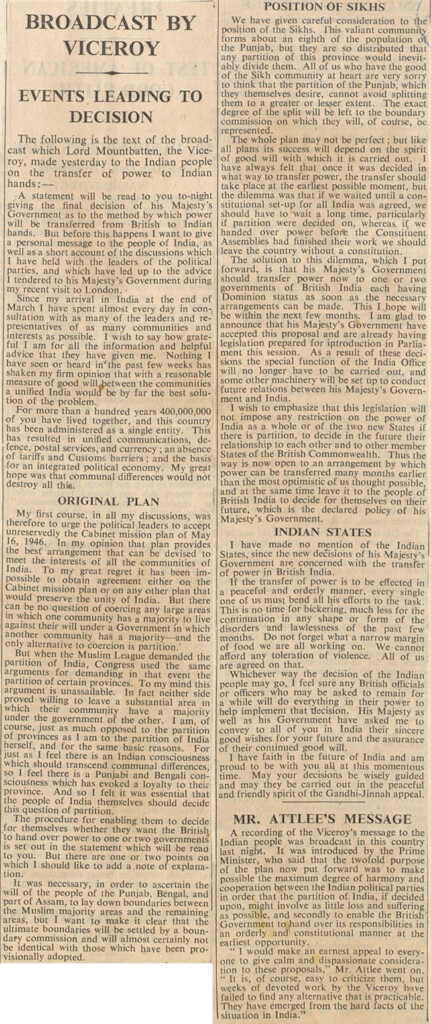
Hazrat Musleh-e-Maud’sra guidance
Interestingly, just a month before this announcement, on 1 May 1947, Hazrat Mirza Bashiruddin Mahmud Ahmad, Khalifatul Masih IIra had delivered a speech, titled “Hindustani uljhanon ka aasaan tareen hal” (A simple solution to the problems of India).
During this speech, Huzoorra advocated that the people of India deserved the right to determine their future themselves, instead of the foreigners deciding it unilaterally. He also granted valuable guidance in regards to the division of Punjab and the North-West Frontier Province (NWFP).
Huzoorra said:
“The current circumstances of India are such that there is no tranquillity and comfort within the hearts of its people, and the public is in extreme anxiety and anguish. […] Some European intellectuals and Indian leaders assume only themselves to be wise, and consider the common Indians to be feeble-minded; and they believe the Indians must accept whatever they decide without any objection and should not dare to express their disagreement at all. […]
“But I believe that as far as freedom is concerned, everyone from around the world is equal and freedom is their birth-right. The common Indians hold the same desire for freedom, which is held by the British, French, German and American people, or Mr Gandhi and Pundit Nehru. […] Therefore, what right does Zaid [A] or Bakr [B] of other countries or a well-known Indian leader hold to [unilaterally] determine the rights of Indians? […]
“But nowadays the foreign countries themselves want to decide the future of Indians and express their respective views from the outside [of India]. In other words, they assume that the Indians do not value freedom, or all of their sentiments and desires for freedom have diminished or weakened.
“The British are saying they have sent a brave, wise, experienced and honest politician [Lord Mountbatten] to solve the problems of Indians. This is all well and good, but I ask; would the English public ever endure if an [foreign] intellectual were sent to decide the issues of their freedom; they would certainly say that ‘We, ourselves understand the value of freedom and we have enough capability to solve these problems.’ […]
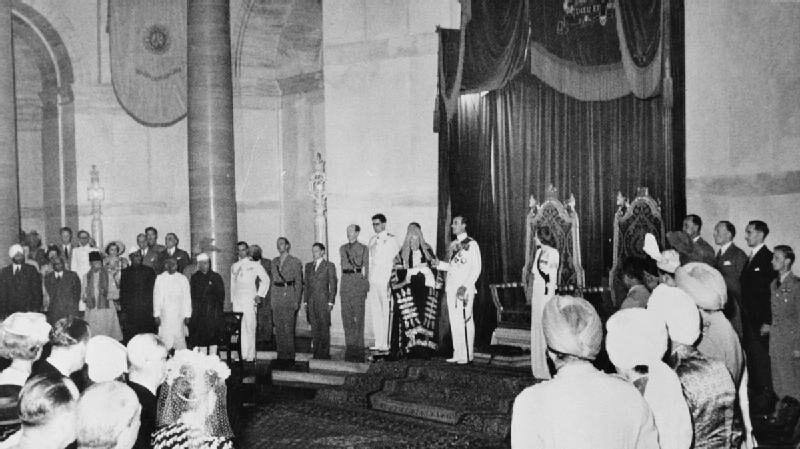
“Does freedom and democracy mean [completely] handing over the future of 400 million Indians to a foreigner – along with some self-devised leaders – who could announce a verdict? Do Indians not have the capability to understand political issues? Do Indians not have wisdom and intellect? Are Indians not able to decide about their fate themselves? Is it appropriate for a democratic nation to treat Indians like cattle?
“The principle should be to ask the people of every district and Tehsil of a certain area or country about their views and wherever there is any doubt, a referendum should be held there.” (Hindustani uljhanon ka aasaan tareen hal, Anwar-ul-Ulum, Vol. 18, pp. 554-556)
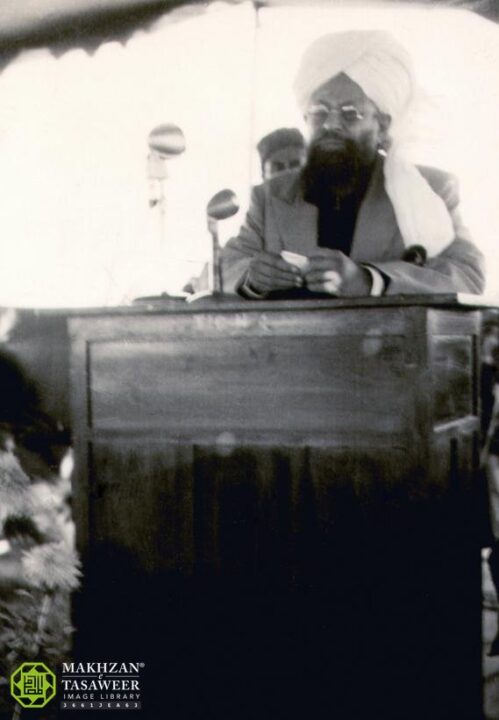
While speaking about the rights of the Indian Muslims, Huzoorra said:
“In my view, if it is proved that the Muslims are justified for demanding their rights, they should be given their rights. In addition, if the Hindus are justified in demanding their rights, their demand should be accepted. However, how does a foreign nation hold the right to decide about the rights of a certain community?
“And particularly, what justification is there for the current treatment Muslims are facing? If the Muslims also have ears, eyes, a brain and wisdom, can contemplate – and are not behind anyone in this regard – and the same is the situation for the Hindus and Sikhs; then why isn’t the decision made after asking the public view in regards to the crucial matters?
“Look at the Punjab for instance, it is a fact that the Muslims have the majority in the Punjab and they are justified in demanding their due rights based on their majority in certain districts of Punjab. Then, what is the reason behind hesitating in giving them their rights? In those districts of Punjab where the Muslims hold the majority, they have many reasons for demanding their rights. However, there are some districts in Punjab where the Hindus are in the majority.
“The Muslims hold a majority in all those districts of Punjab which are located in the West of Lahore and in addition to Gurdaspur, they have a clear majority in five Tehsils situated in the East of Lahore. Moreover, there are some Tehsils where though the Muslim [population] is more than the collective population of Hindus and Sikhs, they become a minority when all the non-Muslim populations are counted. This is because if the ‘untouchables’ join Hindus, the Hindus will have the majority, and if they join the Muslims, then the Muslims will have the majority.
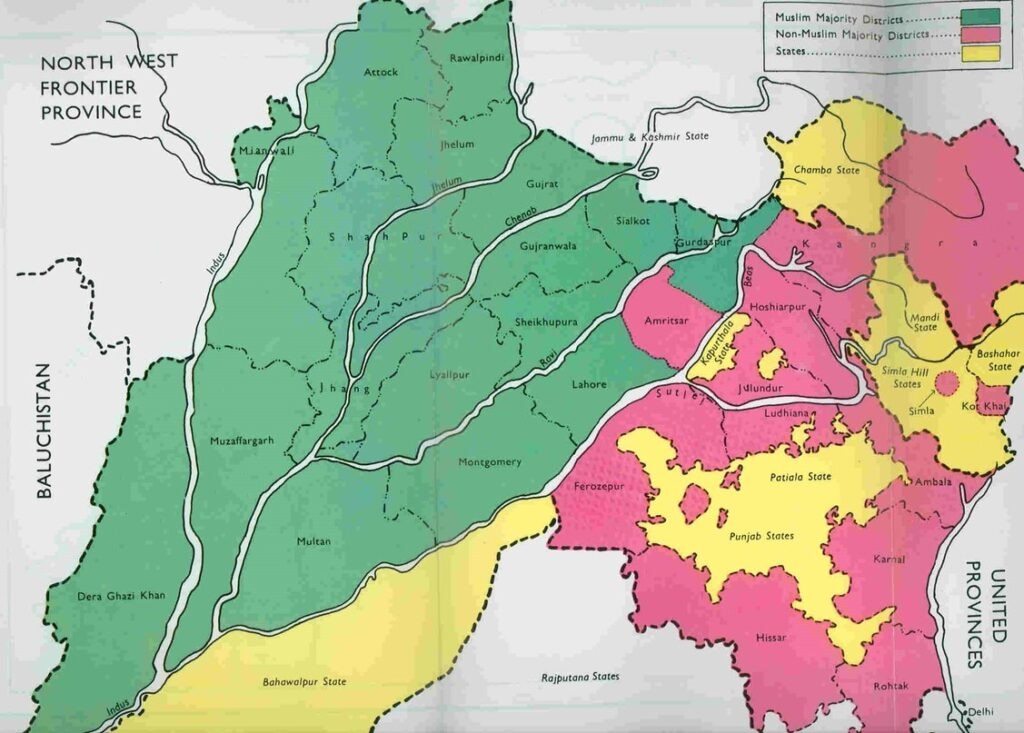
“Therefore, in this situation, the ‘untouchables’ must be asked whom they wish to join? If they say to join the Hindus, they should be sent to the Hindu-majority areas, and if they wish to join the Muslims, then they should be sent to the Muslim area. […] What reason is there not to ask the ‘untouchables’ and Christians about their will, despite the slogans of democracy? Which law makes it valid to declare the Muslims a minority despite being more than the [collective population of] Hindus and Sikhs, just because the ‘untouchables’ – who are not asked about their will – add up to the population of Hindus and Sikhs in comparison to the Muslims? Whereas, the principle should be that wherever the Hindus, Sikhs and Muslims do not hold a clear majority, the minorities should be asked about their will that whom they wish to join. This is such a simple matter which does not even need a British intellectual, nor a French, German or American politician.
“But the situation is such that the foreigners are expressing their views about India and secret consultations are continuing [outside India], just like the deals of horses used to be carried out in the old days; that two persons would touch each other’s fingers behind a curtain and the deal would finalise behind that curtain [secretly]. In the same way, deals about India are being carried out behind the curtain as well. […]
“Nowadays, heated debates are taking place with regards to the issue of the frontier areas. […] Now the question is whether the frontier province wishes to join the Hindus or the Muslims. This question can be answered through a referendum. If this happens, then [in my view] the majority of the frontier [province] would say that they wish to join the Muslim areas.

“However, if elections are fought between the Muslim League and Khudai Khidmatgar [Pashtun non-violent resistance movement], then the Pathan community would still be unable to clearly express their inclination – because considering it to be a partial or un-important question – they will not be ready to leave their former leaders, meaning the Khan Brothers [Khan Abdul Ghaffar Khan and Khan Abdul Jabbar Khan].
“Until the question is not about joining the Muslim areas or the Hindu areas, the votes would be cast for ‘personalities’, instead of the government. Therefore, whenever the matter of benevolence would come in between, the vote would be cast for the benevolent, but when the question would be about the principle, the vote would be cast differently. […] Benevolence is something that makes one feel indebted [to the benefactor]. […]
“If an honest effort is also made to solve the disputes in those areas where the Muslims are in minority, their matters can also be solved. Even the transfer of population is an applicable option if needed for this purpose. This is such a simple matter that even a farmer can understand it, but this issue is not settled because it is not being dealt with psychologically, rather academic formulas are being searched and too many suggestions are being offered in this regard.” (Ibid, pp. 556-561)
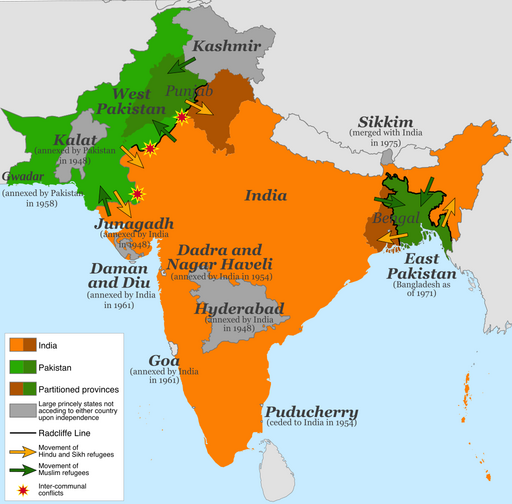
In short, this is a great example of Hazrat Musleh-e-Maudra advocating the right for the person, community or nation to decide their future themselves, instead of others doing it without consulting them.
Related Content
- Hazrat Musleh-e-Maud’s services to the Muslim cause: Guiding Muslims of the Indian subcontinent amid religious and political conflicts
- Hazrat Musleh-e-Maud’s response to the Shuddhi movement and the Jamaat’s relentless services for Islam
- The Simon Commission, First Round Table Conference and Hazrat Musleh-e-Maud’s valuable guidance
- The Wavell Plan and Hazrat Musleh-e-Maud’s call for peace and India’s freedom
- The Simla Conference, 1945: Hazrat Mirza Bashiruddin Mahmud Ahmad’s (ra) guidance prior to the conference and response to its failure
- The Cabinet Mission, 1946: Its background and Hazrat Mirza Bashiruddin Mahmud Ahmad’s (ra) guidance
- The deadlock over Interim Government and Constituent Assembly for India: Its background and Hazrat Mirza Bashiruddin Mahmud Ahmad’s (ra) guidance
- May India and Pakistan live amicably: The Partition of India, 1947 and Hazrat Mirza Bashiruddin Mahmud Ahmad’s heartfelt wish

